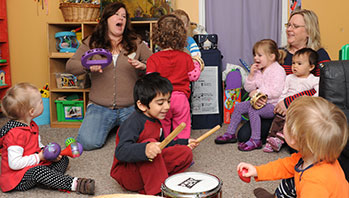MA Standards
English Language Arts/Speaking and Listening/SL.PK.MA.1a: Observe and use appropriate ways of interacting in a group (e.g., taking turns in talking, listening to peers, waiting to speak until another person is finished talking, asking questions and waiting for an answer, gaining the floor in appropriate ways).
Head Start Outcomes
Social Emotional Development/Self-Regulation: Follows simple rules, routines, and directions.
Language Development/Receptive Language: Attends to language during conversations, songs, stories, or other learning experiences.
PreK Learning Guidelines
English Language Arts/Language 1: Observe and use appropriate ways of interacting in a group (taking turns in talking; listening to peers; waiting until someone is finished; asking questions and waiting for an answer; gaining the floor in appropriate ways).
English Language Arts/Reading and Literature 12: Listen to, recite, sing, and dramatize a variety of age-appropriate literature.
Science and Technology/Inquiry Skills: 3 Identify and use simple tools appropriately to extend observations.
Sing Together: “Thank You, Worms”

© Commonwealth of Massachusetts, Department of Early Education and Care (Jennifer Waddell photographer). All rights reserved.
STEM Key Concepts: Earthworms are animals that live in the soil, underground
ELA Focus Skills: Listening and Speaking, Phonological Awareness (Beginning Sounds; Rhythm, Rhyme, and Repetition), Vocabulary
Gather children around the worm habitat. Remind children that gardeners are people who take care of gardens. Ask, Do you think most gardeners like worms? Why do you think that? What are some ways that worms help plants grow? (worms help plants grow by eating plant parts and making soil soft)
Teach children the song “Thank You, Worms.” Have them sing it to their worms to thank them for helping break up the soil.
- Explain that worms do not have ears so they cannot hear, but they can feel sounds with their bodies. Tell children that you want them to watch closely to see if the worms react to the song.
- You might want to distribute magnifying lenses so children can look closely to observe vibrations in the soil.
Thank You, Worms
(sung to the tune of “Frère Jacques”)
Little diggers,
Little diggers,
Eat and move.
Eat and move.
Mix and turn the soil.
Mix and turn the soil.
Thank you, worms.
Thank you, worms.
Social Emotional Tip: Allow children opportunities to share information to help them learn to take turns, stay on topic, and actively listen.
